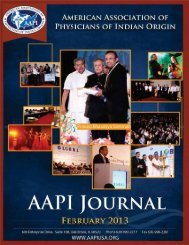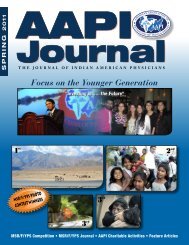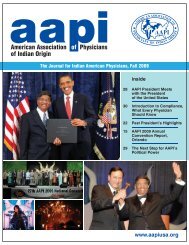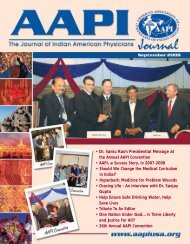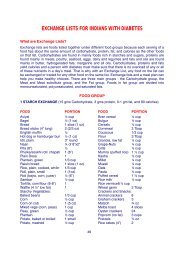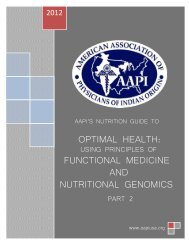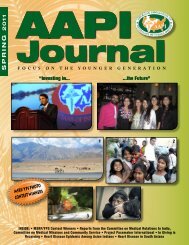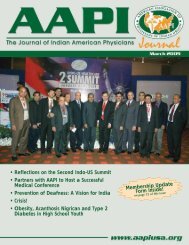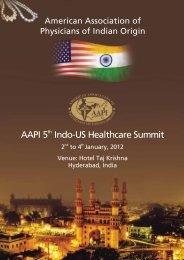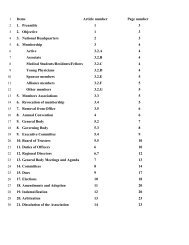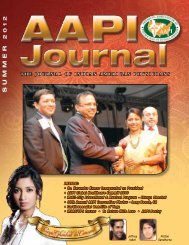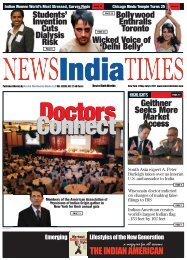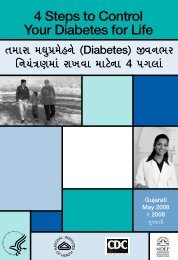functional medicine and nutritional genomics - American Association ...
functional medicine and nutritional genomics - American Association ...
functional medicine and nutritional genomics - American Association ...
Create successful ePaper yourself
Turn your PDF publications into a flip-book with our unique Google optimized e-Paper software.
AAPI’S NUTRITION GUIDE TO OPTIMAL HEALTH: USING PRINCIPLES OF FUNCTIONAL MEDICINE AND NUTRITIONAL GENOMICS<br />
organic cation<br />
transporters<br />
ATP-binding cassette<br />
subfamily B member 1<br />
Drosophila discs large<br />
homologue 5<br />
(also called<br />
OCTN1/OCTN2)<br />
This review is focused specifically on three IBDassociated<br />
genes that appear to identify major<br />
susceptibility loci for CD: 1) CARD15/NOD2, 2)<br />
DLG5, <strong>and</strong> 3) SLC22A4/A5 (OCTN1/OCTN2).<br />
CARD15/NOD2<br />
The CARD15/NOD2 gene located on chromosome<br />
16q12 was the first IBD susceptibility gene to be<br />
associated with Crohn’s disease (35). The CARD15<br />
gene encodes the NOD2 protein, which is thought to<br />
provide protection against invasive bacteria by<br />
eliminating intracellular pathogens in epithelial cells at<br />
the gastrointestinal mucosa barrier (25). NOD2<br />
protein is expressed by monocytes, granulocytes,<br />
dendritic cells <strong>and</strong> by epithelial cells. It functions as an<br />
intracellular sensor of peptidoglycan components of<br />
bacterial cell walls, known as muramyl dipeptide (25).<br />
Muramyl dipeptide (MDP) is a peptidoglycan<br />
component that specifically signals throughout the<br />
CARD15/NOD2 pathway. It is involved in modulating<br />
activity of the immune related transcription factor,<br />
nuclear factor-κB (NF-κB) (25).<br />
There are 3 major polymorphisms that induce structural<br />
changes in the leucine-rich repeats for the<br />
CARD15/NOD2 gene (13,38). They are (see Table<br />
2):<br />
i. Arg702Trp (35,41)<br />
ii. Gly908Arg (35,41)<br />
iii. 1007finsC (35) or<br />
c.3020insC (40,42)<br />
90<br />
1672 C>T<br />
� SLC22A5<br />
-207 G>C<br />
transport or polarity of<br />
the intestinal wall<br />
ABCB1 Affects mucosal<br />
transport or polarity of<br />
the intestinal wall<br />
DLG5 � DLG5 113G>A<br />
� P.P1371Q<br />
� P.G1066G<br />
� Rs2289308<br />
� DLG_e26<br />
� P.D1507D<br />
Affects mucosal<br />
transport or polarity of<br />
the intestinal wall<br />
2012<br />
The above described polymorphisms in the<br />
CARD15/NOD2 gene are all associated with a<br />
decreased <strong>functional</strong> response in stimulating MDP which<br />
appears to lead to NF-КB overexpression <strong>and</strong><br />
inflammation (43,44). In a study by Kobayashi et al.,<br />
the authors concluded that because the protein Nod2,<br />
encoded by the CARD15 gene, is critical in protecting<br />
the host from intestinal bacterial infection, variations in<br />
Nod2 might promote CD due to a defective response<br />
to commensal <strong>and</strong>/or pathogenic bacteria <strong>and</strong> may<br />
contribute to Th1 skewing (45). Therefore, it appears<br />
that defects in the initial innate response <strong>and</strong><br />
subsequent signaling of the adaptive immune response<br />
are associated with increased susceptibility to chronic<br />
gut inflammation (46).<br />
The CARD15/NOD2 polymorphisms are more<br />
prevalent in individuals with IBD as compared with<br />
non-IBD controls, but are not present in all cases of<br />
CD, either in humans or in mouse models. Intestinal<br />
inflammation is not always present in mice that have<br />
CARD15/NOD2 polymorphisms (45) <strong>and</strong> Hugot et<br />
al. (13) reported that 0%-5% of the general<br />
Caucasian population are homozygous for CDassociated<br />
mutations <strong>and</strong> 60%-70% of CD patients<br />
are heterozygous, in that they do not have both<br />
CARD15/NOD2 alleles mutated‛.<br />
Given these discrepancies, it appears that the presence<br />
of CARD15/NOD2 gene variants may be a



